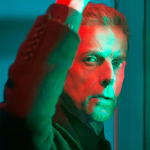Oh wait, this is a Doctor Who blog. But actually, this is pretty Christmassy - though you’d struggle to have Santa and for it to not be. There’s plenty more stuffed in here too, with traditional sci-fi science bases, icky monsters and clever fantasy trickery. Ho ho ho! This isn’t exactly light Christmas fare - the plot is more important than most for these specials - but it’s deceptively complex, a run-around that has its focus on Clara leaving the Doctor more than anything.
Let’s not forget that Santa is the big selling point here - the real Santa! Santa in Doctor Who - it’s genius! Nick Frost fills out the character in every way, breathing life into the traditional image without sending it up, even when wisecracking. He easily stands up to Peter Capaldi, even if it feels like he should be in far more scenes than he is. The other characters fall into the shade but they seem well cast, with Faye Marsay perhaps unexpectingly standing out the most.
In fact, with Santa appearing (real living Santa!) along with all the trimmings, it’s a surprise that the whole thing isn’t sent up. It’s not that preposterous by Doctor Who standards, but it could easily slip. But this is coming from the director of the foreboding and adult Kill the Moon and it’s a Steven Moffat script, and so is full of Moffat tricks. Would any other show on telly at the moment be up to an episode full of dream sequences and televisual quirks with nobody batting an eye? Perhaps Black Mirror or Sherlock do the same sort of thing too, but that’s about it. For Christmas Day viewing they aren’t going soft: this episode throws in everything - some with complete success (Slade beats monsters!) and some that feel slightly too indulgent (Michael Troughton’s cool death feels like merely that).A special mention has to go to the design and the effects too - we’re in proper movie territory here.
If there’s a downside, it’s that it’s not movie length. The sixty minutes flew by, but here more than ever it feels there’s not enough time to take everything in, especially when you’ve got these sorts of big ideas. The lack of exposition at the start - it skips from Clara meeting the Doctor again to investigating the space base very quickly with little to no reason why it’s all happening - is a clever double bluff, especially clever as it’s the sort of frantic opener we’re used to (or that I’m used to not enjoying!). But even if it’s part of the plot, I think the beginning of the episode suffers because of it.
I did want to see more of Santa being Santa, or even more of Clara and the Doctor being themselves rather than being in mortal danger. This episode has it in spades, managing to keep up a strong pace when the plot itself is literally unravelling as we’re told to forget what previously happened. It’s a puzzle box of an episode that works (and only works really) as a one-off special, and the whole thing feels very solid rather than the writer constantly keeping the plates spinning when the dreams start recurring. It helps of course that the core elements are so joyfully mismatched - yes, some of them come very close to ripping things off (it even mentions most of its film influences in the episode itself), but it’s exactly the sort of thing we want to see. And it’s Christmas. So there.
The most recent series isn’t nearly forgotten about (after all, it’s only been a couple of months since it finished). It’s a proper continuation rather than the tradition in recent years of being standalone in style and tone as well as the characters. This dealt with the same relationships that we saw in Death in Heaven, almost trying to top it. I love that they brought Danny back indulgently as a Christmas present, but sort of gave him a proper goodbye without spoiling the previous one. And that ending that kept you guessing? Like in the Wham song, I think we might all need to be given new hearts after this one.
many thanks to


















































